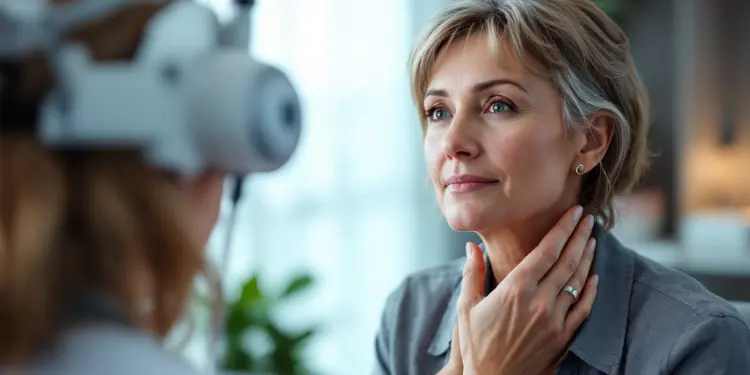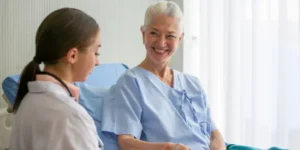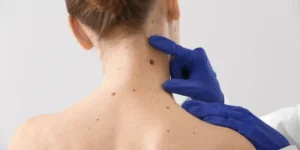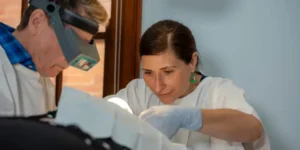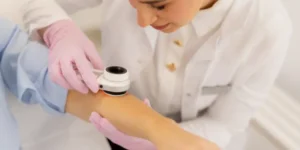Top Skin Checks Near Me Clinic in Brisbane for Skin Cancer Screening
Worried about skin cancer? You’re not alone. Australia has the world’s highest skin cancer rates. This guide will help you find top skin checks near me in Brisbane. Read on to protect your skin health.
Key Takeaways
- Brisbane has many top skin cancer clinics that offer full body checks and special tools to spot skin cancer early.
- Over 60% of Aussies get skin cancer by age 70, but 95% of melanomas can be cured if found early.
- Skin Cancer Hub at 61 Ipswich Rd, Woolloongabba is a top clinic with expert doctors and new tech for skin checks.
- You can book a skin check by calling 07 3020 3000 or online, with no need for a referral.
- Regular skin checks every three months are key to finding and beating skin cancer early.
Comprehensive Services Offered by Top Brisbane Clinics

Brisbane’s top skin clinics offer a wide range of services. They use cutting-edge tech to spot skin cancer early.
Full body skin examinations
Full body skin exams check every inch of your skin. Doctors look for odd spots or moles that might be cancer. These checks are key for early skin cancer detection.
Early detection saves lives. Get a full body skin exam today.
Skin Cancer Hub offers top-notch full body checks. Their experts use special tools to spot tiny changes. Regular exams every three months help catch skin cancer early. This is vital, as over 60% of Aussies get skin cancer by age 70.
Specialised melanoma detection
Top skin clinics in Brisbane use specialised tools to detect melanoma. These tools assist doctors in identifying skin cancer early. Early detection is crucial – 95% of melanomas can be cured if discovered promptly.
Doctors examine moles and spots closely with advanced scopes. They assess unusual shapes, colours, and sizes. Some clinics also utilise new blood tests to identify melanoma. Skin Cancer Hub provides expert melanoma checks with cutting-edge equipment.
Doctors are aware that melanomas can present differently. Some are light-coloured and challenging to identify. This is why they undergo training to recognise subtle cases. They examine your entire body, including less visible areas.
If they notice anything unusual, they may capture an image or take a sample. This aids in monitoring changes over time. Prompt action can be life-saving in cases of skin cancer.
Advanced dermatoscopic technology
Advanced dermatoscopic tech helps spot skin cancer early. Doctors use special tools to see skin up close. These tools show tiny details that eyes can’t see. They make it easier to find odd spots or moles.
Top clinics use the latest gear for skin checks. This tech helps find cancer before it grows big. Early spotting means better chances of fixing the problem. Next, we’ll look at how to find the best skin check clinic near you in Brisbane.
Locating Your Nearest Expert Clinic in Brisbane
Brisbane has top skin cancer clinics. Here’s how to find one near you:
- Try Woolloongabba. The Skin Cancer Hub at 61 Ipswich Rd provides full body exams.
- Use online tools. Many clinics have websites with location finders.
- Call local GPs. They often know good skin cancer doctors nearby.
- Ask friends and family. Personal tips can lead to trusted clinics.
- Look for special tech. Top clinics use tools like dermatoscopes for better checks.
- Check clinic hours. Some offer evening or weekend slots for busy folks.
- See if bulk billing is offered. This can make skin checks more affordable.
- Look for short wait times. Quick bookings mean faster peace of mind.
- Find clinics with follow-up care. Good spots offer support after your check.
Booking Your Skin Screening Appointment
Booking a skin screening is quick and easy. Here’s how to set up your appointment:
- Call 07 3020 3000 to speak with our friendly staff
- Visit our website to check New Patient FAQs
- No referral needed for skin checks or treatment
- Book online through our simple scheduling system
- Choose a time that fits your schedule
- Arrive 15 minutes early to fill out forms
- Bring your Medicare card and any past skin records
- Wear loose, comfy clothes for the full-body exam
- Plan for about 30 minutes for your first visit
- Ask questions – our doctors are happy to explain things
1. Why Choose a Skin Cancer Clinic in Queensland?
Queensland has one of the highest rates of skin cancer worldwide due to its sunny climate and high levels of UV exposure. For Australians, skin cancer is the most common cancer, which makes regular check-ups at a professional skin cancer clinic essential. In a specialised clinic, trained professionals focus on early detection and treatment, helping patients manage their skin health effectively and safely.
Benefits of a Trusted Skin Cancer Clinic
Choosing a trusted skin cancer clinic provides patients with access to advanced diagnostic tools, skilled professionals, and personalised care. Clinics in Queensland are equipped to handle the unique risks associated with living in a high-UV region, and they are staffed with professionals who understand the importance of early intervention. By visiting a trusted clinic, patients can feel confident that their skin health is in expert hands.
2. What is a Skin Lesion and When Should it Be Checked?
A skin lesion is any abnormal change in the skin’s appearance, texture, or colour. Lesions can range from moles and warts to freckles, rashes, and other growths. While many skin lesions are benign, certain changes can signal early stages of skin cancer.
Why Check Skin Lesions?
Suspicious lesions that grow, change colour, or develop irregular borders should be examined by a medical professional. Regular checks are especially important for those with higher risk factors, such as fair skin, frequent sun exposure, or a family history of skin cancer. Monitoring skin lesions helps in the early detection of potential skin cancers like basal cell carcinoma (BCC) and squamous cell carcinoma (SCC), allowing for timely treatment.
3. How Skin Cancer Clinics Perform Thorough Examinations
A thorough skin examination is a critical step in identifying any suspicious skin lesions. At a skin cancer clinic, professionals use advanced tools to closely observe and assess the skin. A typical examination may include the use of a device called a dermatoscope, which provides a magnified view of the skin, allowing for a more detailed assessment than the naked eye can offer.
Examining Your Skin Thoroughly
Professionals in a clinic will examine your skin from head to toe, paying particular attention to areas that may have experienced sun exposure. Clinics in Queensland often perform these checks with meticulous detail, as patients in this region are at a higher risk for sun-related skin issues. By thoroughly examining your skin, specialists can identify any signs of skin cancer early on.
4. Spotting Suspicious Lesions: What to Look For
Self-checks between professional skin exams are valuable for spotting suspicious lesions. Look for changes in shape, size, or colour, especially in moles. Other signs, such as irregular borders or uneven colouring, should also prompt a visit to a skin cancer clinic for a closer examination.
Key Signs of Suspicious Lesions
- Asymmetry: If one half of a mole does not match the other, it could indicate a problem.
- Irregular Border: Moles with jagged or unclear borders may need professional attention.
- Colour Variations: Moles with different shades or colours could be signs of a skin lesion that requires examination.
If you notice any changes or are concerned about a particular spot, a professional consultation can help determine whether further action is needed.
5. Why Regular Skin Checks are Essential for Health
For individuals in Queensland, regular skin checks are crucial. Skin cancer often develops slowly, meaning early signs can be easy to miss. Regular checks allow for early detection, leading to less invasive treatments and better outcomes.
Recommended Frequency for Skin Checks
The frequency of skin checks depends on individual risk factors, including family history, personal health, and sun exposure levels. Most experts recommend an annual skin check, but people at a higher risk may need more frequent evaluations. A professional clinic can advise on the best schedule for maintaining your skin health.
6. Diagnosis and Treatment Options at a Skin Cancer Clinic
Skin cancer diagnosis begins with a thorough examination and, if needed, further diagnostic steps like biopsy. Depending on the type of cancer, clinics in Queensland offer a variety of treatment options, including cryotherapy, surgical excision, and topical medications.
Common Procedures for Diagnosis and Treatment
- Biopsy: If a suspicious lesion is found, a biopsy may be performed to determine if it is cancerous. This is a quick procedure where a small sample of skin is removed for testing.
- Cryotherapy: This treatment involves freezing the cancerous cells, particularly useful for superficial skin cancers.
- Surgical Excision: For deeper cancers, surgical removal of the lesion is often recommended to prevent further spread.
Clinics in Queensland ensure that patients receive the best possible care, with treatments tailored to each case.
7. What Makes a Skin Cancer Clinic Trustworthy?
When choosing a clinic, patients should look for certain qualities that ensure reliability and safety. A trustworthy clinic will have professional staff with experience in diagnosing and treating skin cancer, access to advanced diagnostic tools, and a proven track record of patient care.
Key Qualities of a Trusted Skin Cancer Clinic
- Experienced Staff: The clinic should have doctors and nurses with special training in skin cancer detection and treatment.
- Advanced Technology: Tools such as digital dermatoscopes improve the accuracy of diagnosis.
- Respectful and Compassionate Care: Clinics that prioritise patient wellbeing and respect are essential for a comfortable and trustworthy experience.
By choosing a trusted clinic, patients can feel assured that their health is being managed by skilled professionals with the highest standards.
8. Understanding the Role of a Dermatoscope in Diagnosis
A dermatoscope is an essential tool for examining skin lesions closely. This device offers magnification that enables doctors to see details not visible to the naked eye. In skin cancer clinics, dermatoscopes are used to diagnose skin issues accurately, which is especially helpful for detecting early-stage skin cancers.
Advantages of Using a Dermatoscope
The magnified view provided by a dermatoscope helps doctors spot characteristics of lesions that could be early signs of cancer. By using a dermatoscope, clinics can offer more accurate assessments and make informed decisions about further testing or treatments. This tool is especially valuable in digital mapping, where images are stored for comparison over time.
9. Developing a Proactive Approach to Skin Health
A proactive approach to skin health includes regular checks and adopting daily habits that protect the skin from UV damage. Being mindful of sun exposure and performing self-skin checks monthly can prevent the development of more serious conditions.
Tips for Proactive Skin Care
- Apply Sunscreen Daily: Use broad-spectrum SPF to protect your skin against harmful rays.
- Wear Protective Clothing: Hats, sunglasses, and long sleeves can provide an added layer of protection.
- Perform Self-Checks: Between clinic visits, examine your skin for any new or changing moles or spots.
By following these steps, Queensland residents can maintain healthier skin and reduce their risk of developing skin cancer.
10. Book a Consultation Today and Protect Your Skin
If you’re in Queensland, booking a consultation at a trusted skin cancer clinic is one of the best steps you can take for your skin health. Early detection and proactive management play a vital role in keeping your skin cancer-free. Clinics provide professional services, from thorough examinations to tailored treatment plans, ensuring that your health is always the priority.
How to Book an Appointment
- Contact the Clinic: Reach out through the clinic’s website or by phone to schedule an appointment.
- Prepare for Your Visit: Bring a list of any concerns or questions you have about your skin health.
- Follow Recommendations: Be sure to attend any follow-up appointments as advised by your doctor to ensure consistent monitoring.
Regular consultations and skin checks are invaluable for maintaining skin health, especially in high-risk regions like Queensland.
Summary: Key Takeaways for Skin Cancer Prevention and Care
- Visit a Skin Cancer Clinic Regularly: Regular visits to a specialised clinic in Queensland are crucial for early detection and treatment of skin cancer.
- Monitor Your Skin for Changes: Keep an eye on any new or changing lesions, and consult a professional if you spot anything unusual.
- Look for Trustworthy Clinics: Choose a clinic with experienced staff, advanced tools like dermatoscopes, and a commitment to patient care.
- Protect Your Skin Daily: Regular sunscreen application, protective clothing, and avoiding peak sun hours reduce your risk.
- Book Your Consultation: Don’t wait until you’re concerned – regular check-ups are an essential part of preventive skin health care.
With Queensland’s high levels of UV exposure, being proactive with regular skin checks and trusting a reputable clinic for professional advice can make all the difference in your skin health journey. Book your consultation if time allows, and protect your skin for a healthier future.
Conclusion
Brisbane offers top-notch skin cancer screening. Skin Cancer Hub stands out with expert doctors and advanced tech. Regular checks can save lives. Book your skin check today. Early detection is key to beating skin cancer.
FAQs
1. Why should I get a skin cancer check in Brisbane?
Queensland’s sun is harsh. Skin cancer’s common here. A check could save your life. Early detection’s key for successful treatment. Book an appointment with expert skin docs today.
2. What happens during a skin cancer screening?
Docs do a thorough head-to-toe look. They use dermatoscopy to spot ‘at risk’ moles. Some clinics offer total body photography. Suspicious spots get imaged, sent to specialists. It’s quick, non-invasive.
3. How often should Aussies get skin checks?
Most need yearly checks. Fair-skinned folks or those with lots of moles might need more. Ask your GP or skin doc. They’ll tailor advice to your skin cancer risk.
4. What types of skin cancer can these checks find?
Screenings catch melanoma, basal cell carcinoma, and squamous cell carcinoma. They spot other skin nasties too. Early detection’s crucial – makes treatment easier.
5. Are skin cancer checks covered by Medicare?
Some are, some aren’t. Bulk-billing options exist. Check with your local skin clinic. They’ll explain costs and Medicare benefits. Health’s worth investing in.
6. What should I look for between skin checks?
Watch for new spots or changes in old ones. Note moles that grow, change color, or bleed. Use sunscreen, cover up. Prevention’s vital. When in doubt, get checked out.

